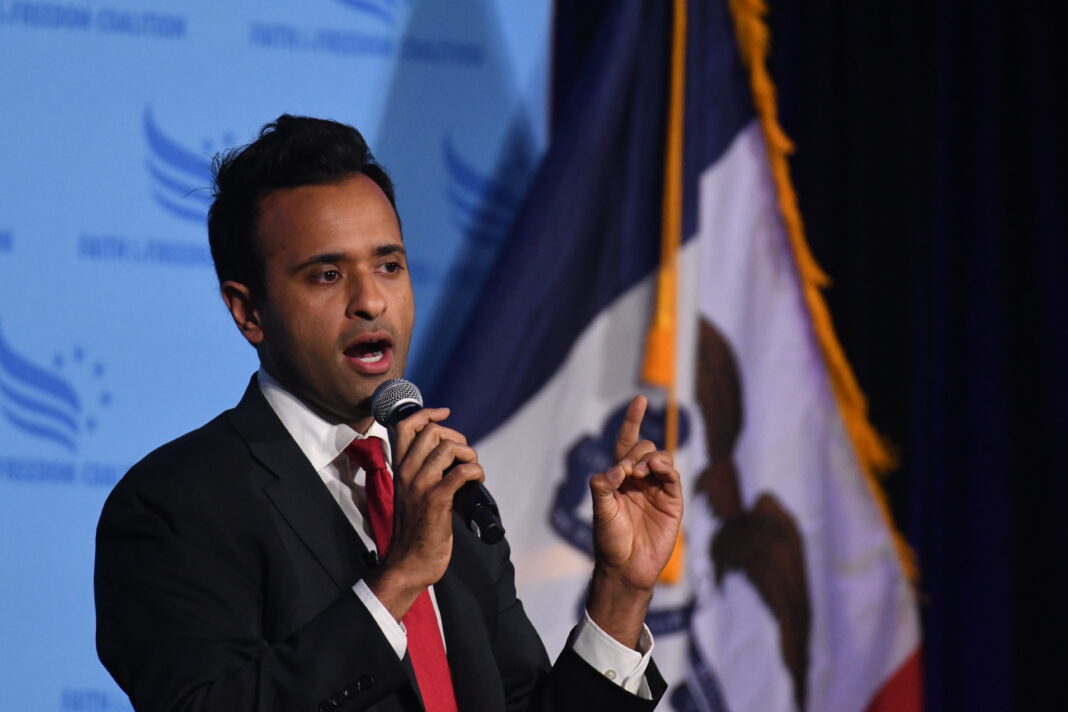By Fred Lucas
The Daily Signal
National standards, including requiring an ID to vote and making Election Day a national holiday, are needed to ensure free and fair elections, says Republican presidential candidate Vivek Ramaswamy.
While states typically run elections, the federal government has set minimum standards under the Help America Vote Act of 2001, and prior to that, the National Voter Registration Act of 1993 and the Voting Rights Act of 1965, to ensure election integrity.
“The federal government should set minimal standards. You have historical precedents for that, dating back 20 years. The federal government can set minimal standards,” Ramaswamy told The Daily Signal Friday after participating in the Thanksgiving Family Forum, an event hosting three Republican presidential contenders and staged by the Iowa-based Family Leader. The Daily Signal was the media sponsor.
The other GOP presidential contenders at the forum were Florida Gov. Ron DeSantis and former South Carolina Gov. Nikki Haley. Former President Donald Trump did not accept an invitation to joint the forum.
“Making an election a national holiday is important, single-day voting on Election Day as a national holiday, with paper ballots and government-issued ID to match the voter file—that’s the standards I want to be done in national elections,” Ramaswamy said.
Ramaswamy, who founded the pharmaceutical company Roivant Sciences, also staked out positions on abortion, Big Tech, and border security.
Although voters in his home state of Ohio approved a state constitutional amendment for abortion without restrictions through the ninth month of pregnancy, he said that’s no reason for pro-lifers to back down.
He said if pro-life advocates had offered an alternative amendment, Ohio voters would have “flocked to it.”
“We need to offer an alternative of our own. I think that’s part of what was missing,” Ramaswamy said. “If there was a different amendment that was on the table in my home state of Ohio, people would have gone for it, flocked for it. The reality is that that didn’t exist. That’s why we lost.”
He added that should be seen as lessons learned for the movement.
“I don’t think the right answer is to compromise on our principles,” he said. “So, I think, stand for principles, but in a way that unites the country.”
During the forum, Ramaswamy, Haley, and DeSantis all expressed their strong support for protecting life.
On the illegal immigration border crisis, Ramaswamy said the federal government should take a more aggressive approach.
“Use our military to secure the border,” Ramaswamy said. “Use aquatic barriers on the southern border. End federal funding for sanctuary cities and end any funding or foreign aid to Central American countries until they’ve dealt with their end of the problem. End birthright citizenship for illegal migrants, for whom the Constitution was never intended to apply.”
Sanctuary cities are jurisdictions that refuse, as a matter of public policy, to cooperate with federal immigration authorities.
Birthright citizenship occurs when illegal immigrants enter the United States and have children, who automatically become citizens under current law by virtue of being born in the country. The Supreme Court determined in an 1898 case that the 14th Amendment applied to anyone born on U.S. soil even though the language of the amendment doesn’t specify this.
Ramaswamy says the way to hold Big Tech companies accountable for censorship is to amend existing federal law, Section 230 of the Communications Decency Act, which protects social media platforms from being held liable for the content users posts.
“My answer is, Section 230 should be an opt-in statute,” he said.
Social media platforms have favored some political and social content over others, acting as a publisher. Companies that opt in to the liability protections should be prohibited from censoring content, he said.
“If you opt in to it, then you are bound by the same constraints as the government itself, including the First Amendment. If not, there is the free market. You’re free, and you don’t get special liability protection. If you want special liability protection, you are bound by the same standards as the government. That’s the First Amendment.”
















